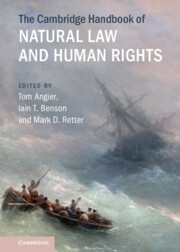Book contents
- The Cambridge Handbook of Natural Law and Human Rights
- The Cambridge Handbook of Natural Law and Human Rights
- Copyright page
- Contents
- Contributors
- Acknowledgements
- Introduction
- Part I Natural Law and the Origins of Human Rights
- Part II Natural Law Foundations of Human Rights Obligations
- Part III Natural Law and Human Rights within Religious Traditions
- Part IV The Human Person, Political Community, and Rule of Law
- Part V Rival Interpretations and Interpretive Principles
- 24 Moral Pluralism, Political Disagreement, and Human Rights
- 25 Human Rights Law and Adjudication
- 26 Natural Law and Human Rights amid the Legal Ruins of Liberal Scepticism, Values Language, and Global Resets
- 27 Human Rights and the Modes of Judicial Responsibility
- 28 The Right to Religious Freedom
- 29 Natural Law, Rights of the Family, and International Human Rights Instruments
- 30 Natural Law and Socioeconomic Rights
- 31 Solidarity and Global Allocation of COVID-19 Vaccines
- Part VI Challenges and Future Prospects
- Index
25 - Human Rights Law and Adjudication
The Role of Determinatio
from Part V - Rival Interpretations and Interpretive Principles
Published online by Cambridge University Press: 03 November 2022
- The Cambridge Handbook of Natural Law and Human Rights
- The Cambridge Handbook of Natural Law and Human Rights
- Copyright page
- Contents
- Contributors
- Acknowledgements
- Introduction
- Part I Natural Law and the Origins of Human Rights
- Part II Natural Law Foundations of Human Rights Obligations
- Part III Natural Law and Human Rights within Religious Traditions
- Part IV The Human Person, Political Community, and Rule of Law
- Part V Rival Interpretations and Interpretive Principles
- 24 Moral Pluralism, Political Disagreement, and Human Rights
- 25 Human Rights Law and Adjudication
- 26 Natural Law and Human Rights amid the Legal Ruins of Liberal Scepticism, Values Language, and Global Resets
- 27 Human Rights and the Modes of Judicial Responsibility
- 28 The Right to Religious Freedom
- 29 Natural Law, Rights of the Family, and International Human Rights Instruments
- 30 Natural Law and Socioeconomic Rights
- 31 Solidarity and Global Allocation of COVID-19 Vaccines
- Part VI Challenges and Future Prospects
- Index
Summary
The idea of determinatio – first identified and analysed in natural law theory – is crucial for understanding international human rights adjudication. Human rights, as they appear formulated in international human rights treatises and declarations, require specification, implementation, concretisation, i.e., determinatio, at the domestic level. I argue that there are good reasons for this to be so. One such reason is that determinatio allows for the application of a norm to be sensitive to the particular circumstances in which it takes place. Determinatio entails deference in human rights adjudication, the latter being the legal consequence of the reasonable space for discretion granted to states which is entailed by determiatio in international human rights law. Close attention to determinatio allows us to see well-known doctrines of deference (such as the doctrine of the margin of appreciation, of regional consensus and of incrementalism) in a different light—not as concessions to state sovereignty, but as grounded on reasons internal to the legal practice of human rights law, of which determinatio is an integral part.
Keywords
- Type
- Chapter
- Information
- The Cambridge Handbook of Natural Law and Human Rights , pp. 371 - 384Publisher: Cambridge University PressPrint publication year: 2022



